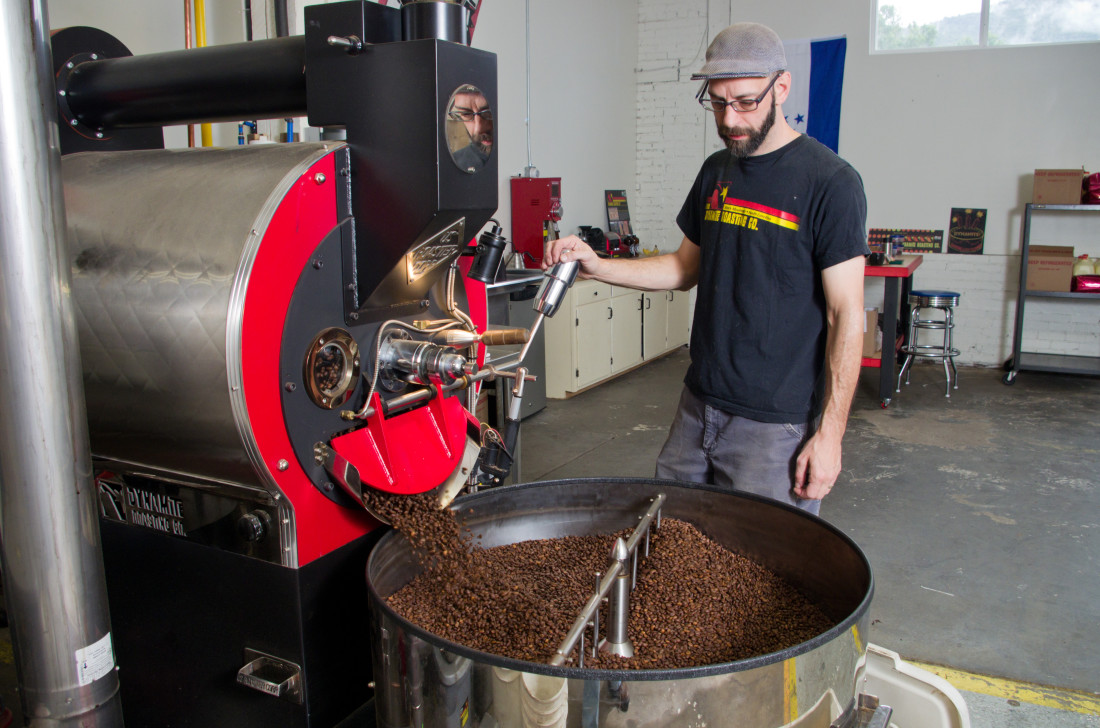Great coffee is no different from any other art form: The quality of the final product depends both on material and process.
“We can make really great green coffee taste terrible; we can make really great green coffee taste great. But we can’t make bad green coffee taste good: We can only work with what we’ve got,” says Andy Gibbon, co-owner of Dynamite Roasting Co.
Freshly roasted artisanal coffee can be found all over Western North Carolina — a multitude of local java businesses, from Black Mountain’s Dripolator to Candler’s Mountain City Coffee Roasters, roll their own beans. In fact, the coffee culture has become one of the area’s defining characteristics. But how many locals could tell you what goes into creating the perfect cup of coffee?
Although the roasting process is important, it’s far from the only piece of the puzzle. “The farmer’s input is really important to what we do here,” Gibbon explains. “The better job they do, the easier it’s going to be for us to roast good coffee.”
The beans start their arduous journey as the seeds derived from what are known as coffee cherries — the fruit of the coffee tree. Coffee cherries are picked, usually by hand, and then the seeds are separated from the pulpy exterior.
“There are machines that pick coffee in parts of the world, usually Brazil,” says Gibbon. “What we are working with is top-level, specialty-grade coffees, so we only use ripe cherries, because that’s what tastes good, and the only way to do that is by hand-picking.” Typically, there are two seeds per cherry, but occasionally only one of them develops. This single, more rounded seed is known as a peaberry.
“We source from all over the world, because each one is different, and even farm to farm in the same neighboring valley, it’s going to be very different. Colombian coffee tastes different from Brazilian coffee and Peruvian coffee, even though they’re all South American,” he continues.
Coffee trees are picky: In order to thrive, they require highly specific conditions. “It needs to be close to the equator, because you can’t have freezing temperatures. But you’ve got to have some difference between daytime and nighttime temperatures, which is one of the reasons that coffee is usually grown on top of mountains,” Gibbon says. “You have to have altitude and not freezing temperatures, so there’s only a narrow band where coffee can actually be grown.” That narrow band is known as the coffee belt.
Specialty coffees are produced on small farms along the equator, hand-picked, processed and then finally shipped through a coffee broker. The green beans typically arrive packed in big burlap bags piled on pallets. Andi O’Gorman and Greg Bounds, who own Asheville Coffee Roasters on Weaverville Highway, work hard to form relationships with the farmers who grow their beans. “We know the South American estate that provides our coffee really well; we’ve been invited down there numerous times,” O’Gorman says.
PennyCup Coffee Co. is a small-batch roasting operation that began rolling beans in Asheville in February. After the coffee sacks have been hauled into the facility, notes owner Bill Tanner, “We do a cupping and we figure out a roasting profile that we like, and then it’s fairly easy — we just follow the recipe.”
PennyCup roasts in 8-pound batches, so what customers get was most likely made to order. “Our roasts take anywhere from 10 to 15 minutes, depending on the profile,” says Tanner. “Once we get it to the temperature that we want, called the charge temperature, we release the arm, and the beans go from the hopper into the drum. … As soon as all that cold mass enters, the temperature plummets, and then we simply raise it again. The specific profile for coffee is determined by gauging the rate of that rise.”
That may be a key step, but all sorts of other factors also influence the way a particular cup of coffee ends up tasting: the location of the farm, the workers who pick and process the beans, even the coffee brokers.
“The analogy to wine grapes is a good one,” says Gibbon. “You’ve got different varietals: chardonnay grapes and merlot grapes, and they taste different. But if you grow chardonnay grapes in France, they’re going to taste different from chardonnay grapes grown in California. Soil conditions, processing techniques, climate, moisture — all those things that affect wine grapes are going to affect coffee in the same way.”
O’Gorman concurs, observing, “It is such an incredible journey to get a cup of coffee!”




I am trying to get in touch with Thomas Lussier. My name is Susan Allison from The Buttonwood Tree. Someone wants to purchase a painting he donated to The Buttonwood Tree. We are thinking of making prints. Want to ask him about this etc. my phone/ text is 860-538-4132
If you could pass this on to him I would appreciate. Thank you! Susan
Dear Thomas L, I am greeting you ,can you say some thing about the org ion of coffee test comparing with others coffee growers region of the world
Thank you
dear sir I NEED COFEE ROSTED AND GRANDING MACHIN FOR SMALL SCALE BUSSNESS SO HOW CAN I GET